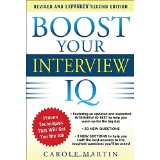When I was journalism major I wrote countless papers. Many of the papers that I would get back had the words, “Show – don’t tell” written on them.
It took a while to figure out what I was not doing and why I was getting this feedback. But once I got it there has been a profound improvement in my writing and ability to tell “stories.”
I now find myself telling my clients the same thing – “Show – Don’t Tell.”
The secret to doing well in a “behavioral interview” is showing the interviewer what you have done — not just telling him or her.
It’s the difference between your stories being flat and uninteresting and sometimes even boring and your stories being fun and interesting to listen to.
As an example, you could say, “I was very angry.” That would be telling. Or, I could show with the words,
“I stormed into the room and slammed the door and threw the books on the table.” I am no longer telling – I am showing my actions. The difference is that when those descriptions are used most people would get the idea of the emotion.
Action is very important in answering behavioral interviewing. The number one mistake made in behavioral interviewing is not “showing” the Action. Most people want to focus on the problem or event and not the action.
Let’s go back a step and talk about “Behavioral Interviewing.” This method of interviewing is not new – it’s been around since the 70’s when industrial psychologists developed a way of “accurately” predicting whether a person would succeed in a job. They concluded that if candidates were asked questions that requested examples of past behavior it would be an indicator of their future behavior.
So, employers began using this interviewing technique to determine whether you were a good fit for the job. The technique is of growing interest to companies who would like to choose the “right” candidate, especially in today’s market with so many candidates to choose from.
The types of questions that are asked using this technique are used to find out how and what you did in the past and the skill sets you used in the process – if you did it before you can do it again!
The difference between a behavioral question and other questions is what the question asks for. A behavioral question will ask for a very specific incident –“a time.”
For example when asked, “Tell me about a time when you solved a problem,” the key words are “a time.” This answer calls for a “specific” example of a “specific” incident.
When traditional questions are asked they usually include the word “if.”
While preparation is important for every interview, it is essential to prepare for the behavioral interview. You must have examples or stories for anything you have claimed on your resume or that you say in an interview.
THE FBI USES BEHAVIORAL QUESTIONS ONLY (DEA, SECRET SERVICE AS WELL)
NO HYPOTHETICAL QUESTIONS ARE ASKED.
There are several methods and acronyms suggested for formatting your stories but the main point to remember is that any story has three key elements:
A beginning – “There was a time….”
A middle – “The action steps I took were…”
An Ending – “The end result was…”
Stories should be interesting and full of action. When you show and don’t just tell – this will happen by itself. Give the interviewer something to remember about you. A savvy interviewer will be able to hear skills from the stories and judge your behavior from your past actions.
The more details and skills you can show and work into your story, the more convincing your story will be. The interviewer will be able to “see” you in action. You will be showing them what you can do.
Preparing your stories before the interview will take the mystique out of behavioral interviewing and allow you to tell the success stories you want your interviewer to see and hear.
By showing them what you can do – HAVE DONE – and who you are you – will enable the interviewer to get a clear picture of you.
THIS IS THE MOST IMPORTANT PART OF THE FED LAW INTERVIEW!
BE YOURSELF!!!

